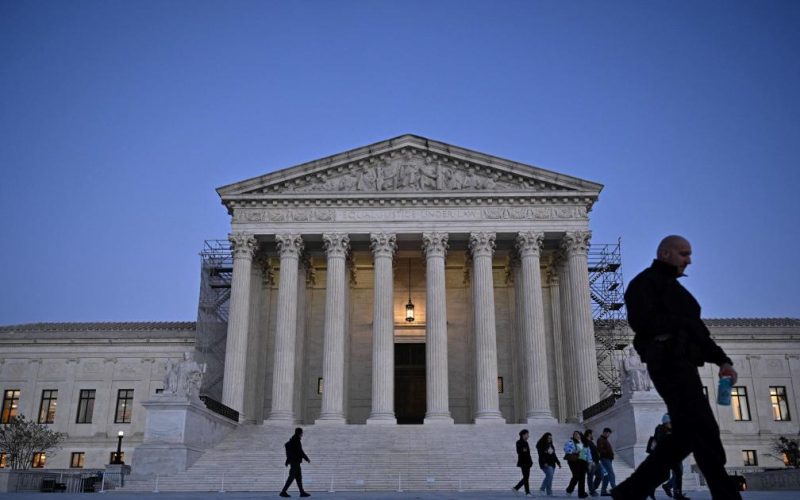The US Supreme Court recently made headlines by sidestepping a pivotal question regarding the implementation of a wealth tax in the case of Moore v. United States. The case, which had the potential to reshape the fiscal landscape of the country, drew significant attention from policymakers, economists, and the general public. This article delves into the intricacies of the case, the Supreme Court’s decision, and its broader implications for wealth taxation in the United States.
Background of the Case

Moore v. United States revolved around the taxation of unrealized gains. The plaintiffs, Charles and Kathleen Moore, challenged the constitutionality of a provision in the 2017 Tax Cuts and Jobs Act (TCJA) that imposed a tax on their foreign earnings that had not yet been realized as income. The Moores argued that this tax violated the Constitution, which stipulates that direct taxes must be apportioned among the states based on population.
The Arguments
The central argument in the case was whether the tax on unrealized gains constituted a direct tax. The Moores contended that the tax was direct and therefore unconstitutional because it was not apportioned. On the other hand, the government argued that the tax was an excise tax, which does not require apportionment. This distinction is critical because direct taxes are subject to stricter constitutional requirements compared to indirect taxes.
Supreme Court’s Decision
In a move that left many legal experts and observers speculating, the Supreme Court chose not to address the fundamental question of whether the tax on unrealized gains was a direct tax. Instead, the Court’s decision focused on procedural grounds, ruling that the case was not ripe for adjudication. This ruling effectively sidestepped the larger constitutional issue, leaving it unresolved.
Analysis of the Supreme Court’s Ruling
The Supreme Court’s decision to avoid the core question of wealth taxation can be seen from multiple perspectives. On one hand, it reflects judicial restraint, avoiding a potentially far-reaching decision that could have significant economic and political ramifications. On the other hand, it leaves a critical issue unresolved, creating uncertainty for taxpayers and policymakers alike.
Judicial Restraint
By opting for judicial restraint, the Court avoided making a ruling that could have disrupted the existing tax system. This approach can be seen as a cautious move, preserving the status quo and allowing the legislative process to address complex taxation issues. It also underscores the Court’s preference to defer to Congress on matters involving intricate economic policies.
Legal Uncertainty
The decision, however, perpetuates legal uncertainty. The unresolved question of how to constitutionally tax wealth and unrealized gains continues to loom large. Taxpayers like the Moores are left without clear guidance, and future cases will likely revisit this issue, potentially leading to prolonged legal battles and instability in tax policy.
Comparative Analysis of Wealth Taxation
To understand the implications of the Supreme Court’s decision, it is helpful to compare wealth taxation practices in different countries. This comparative analysis highlights how other nations address the challenge of taxing wealth and unrealized gains.
Analysis Table: Wealth Taxation Practices
| Country | Wealth Tax Implementation | Tax Rate | Tax Base | Constitutional Issues |
|---|---|---|---|---|
| United States | No federal wealth tax (debated) | N/A | N/A | Direct vs. indirect tax debate |
| France | Yes | 0.5% – 1.5% | Net wealth above €1.3 million | Stable constitutional framework |
| Spain | Yes | 0.2% – 2.5% | Net wealth above €700,000 (varies by region) | Regional differences, stable |
| Switzerland | Yes (cantonal level) | 0.1% – 1% | Net wealth above canton-specific thresholds | Cantonal autonomy, stable |
| Norway | Yes | 0.85% | Net wealth above NOK 1.5 million | Stable constitutional framework |
Implications for US Tax Policy
The Supreme Court’s decision not to rule on the wealth tax question has significant implications for US tax policy. It signals a reluctance to engage in the contentious debate over wealth redistribution through taxation, leaving the onus on Congress to navigate this complex issue.
Legislative Action
The ball is now in Congress’s court to address the taxation of wealth and unrealized gains. Legislative action could provide the necessary clarity and stability, but it is likely to face significant political hurdles. Proposals for a wealth tax have been polarizing, with strong arguments on both sides regarding fairness, economic impact, and feasibility.
Future Legal Challenges
The unresolved nature of the Supreme Court’s decision suggests that future legal challenges are inevitable. Taxpayers and advocacy groups will continue to seek judicial clarification on the constitutionality of wealth taxes, ensuring that this issue remains in the legal spotlight.
Comparative Table: Wealth Tax Arguments
| Argument | Pro-Wealth Tax | Anti-Wealth Tax |
|---|---|---|
| Fairness | Ensures that the wealthy pay their fair share | Penalizes success and investment |
| Revenue Generation | Raises significant revenue for public services | May lead to capital flight and reduced investment |
| Economic Inequality | Helps reduce economic inequality | Could distort economic behavior and harm economic growth |
| Administrative Feasibility | Can be implemented with robust tax enforcement | Difficult to accurately value assets and enforce compliance |
| Constitutional Viability | Can be designed to comply with constitutional requirements | Potential conflicts with the Constitution’s apportionment clause |
Conclusion
The US Supreme Court’s decision to sidestep the wealth tax question in Moore v. United States leaves a critical issue unresolved. While judicial restraint was exercised, the legal and economic uncertainty surrounding wealth taxation persists. As the debate over how to tax wealth continues, the responsibility now falls on Congress to provide clarity and direction. Future legal challenges are likely, ensuring that this issue remains a focal point in discussions about tax policy and economic fairness. The comparative analysis of wealth taxation practices in other countries offers valuable insights, highlighting both the potential benefits and challenges of implementing such a tax in the United States.











